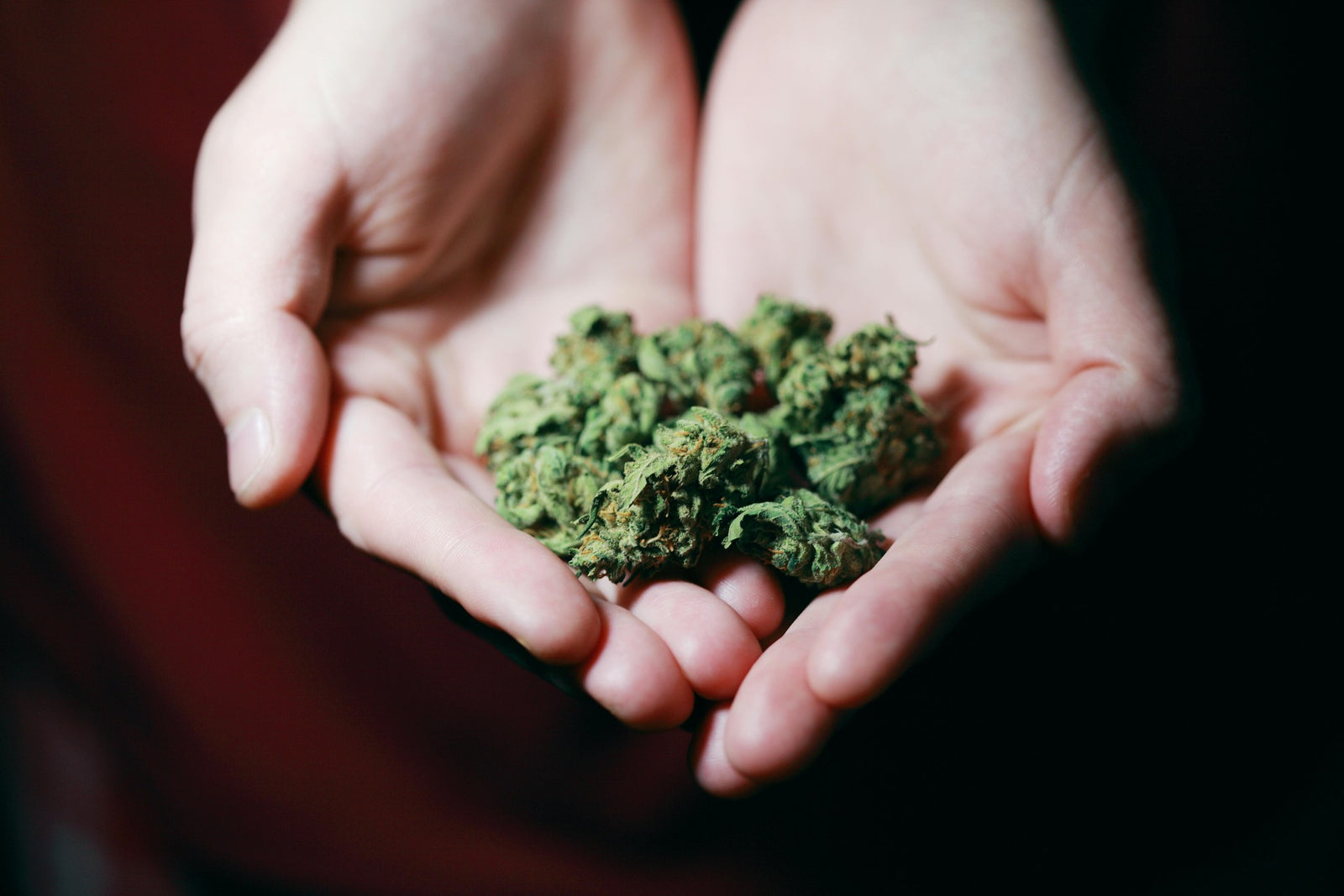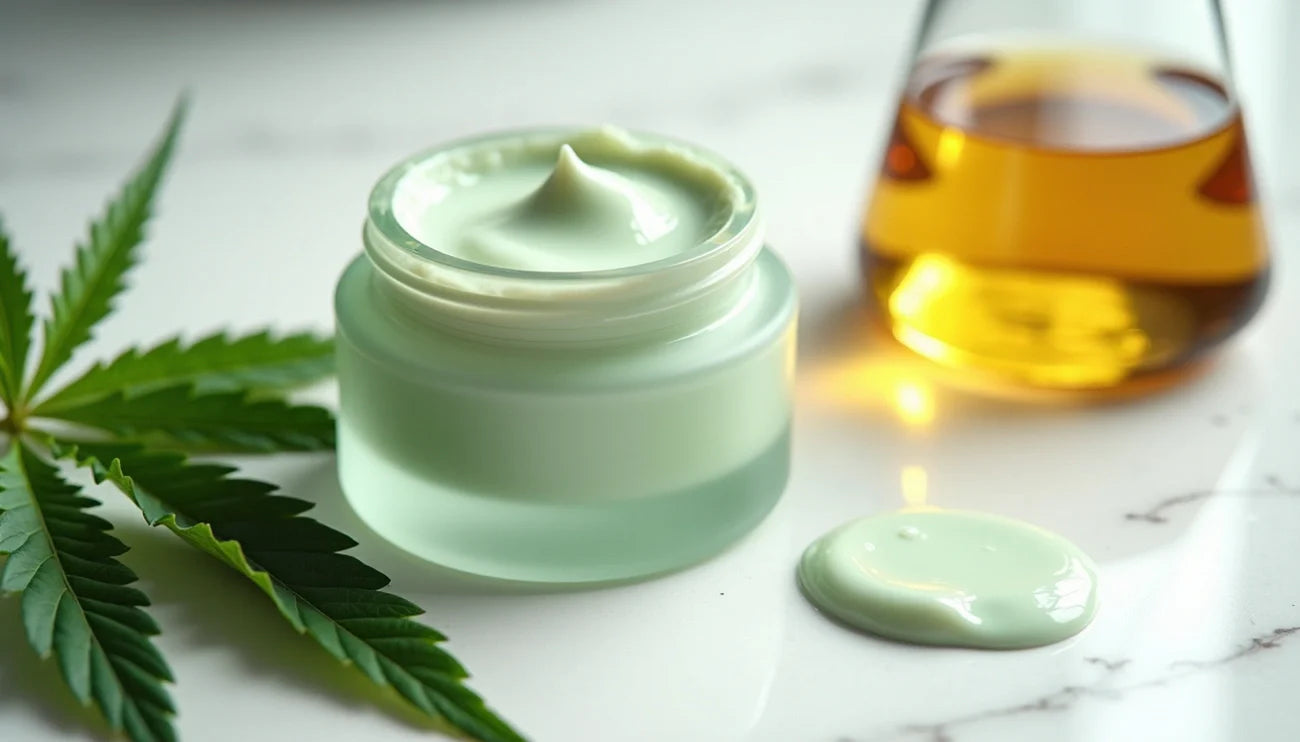Understanding delta-8 THC can be crucial for those exploring cannabinoids. Here's a quick summary if you need the essentials right away:
- Delta-8 THC is a compound found in the Cannabis sativa plant, similar to marijuana but derived from hemp.
- It is less potent than delta-9 THC (common in marijuana) but still causes a psychoactive effect.
- It's synthesized mainly from CBD due to its low natural concentration in the plant.
- It's not FDA-approved and carries potential health risks.
- Legal status varies by state; it's federally legal through a loophole in the 2018 Farm Bill.
Delta-8 tetrahydrocannabinol, or delta-8 THC, is a mildly psychoactive compound found in the Cannabis sativa plant family, which includes both marijuana and hemp. Although present in trace amounts in the raw plant, most commercial delta-8 THC is synthesized from hemp-derived cannabidiol (CBD).
Delta-8 THC has gained attention for its unique effects, offering a gentler high compared to the more well-known delta-9 THC. However, products containing delta-8 THC have not been evaluated by the FDA, and they carry potential health risks. It’s imperative to exercise caution and be well-informed about these products, as they can pose significant health concerns, particularly for children and pets.
Let’s dive deeper into what delta-8 THC is and what makes it a subject of both interest and caution in the cannabis world.
What is Delta-8 THC?
Delta-8 THC, or delta-8 tetrahydrocannabinol, is a cannabinoid found in the Cannabis sativa plant, which includes both marijuana and hemp. Although it is one of over 100 cannabinoids produced naturally by the cannabis plant, it is not present in significant amounts. Therefore, concentrated delta-8 THC is typically manufactured from hemp-derived cannabidiol (CBD).
Cannabinoid and Psychoactive Properties
Delta-8 THC has psychoactive properties, meaning it can alter your mental state, similar to delta-9 THC, the compound most commonly associated with the "high" from cannabis. However, delta-8 THC is known for providing a milder high.

How It Works
Delta-8 THC interacts with the body's endocannabinoid system (ECS), which plays a role in regulating mood, appetite, sleep, and immune response. Specifically, delta-8 THC binds to CB1 receptors in the central nervous system, resulting in its psychoactive effects. Users often report feeling more clear-headed and less anxious compared to delta-9 THC.
Why It's Popular
- Milder Effects: Users find delta-8 THC offers a clearer, less intense high, making it appealing for those who want the benefits of THC without the strong effects.
- Legal Loopholes: Since delta-8 THC is derived from hemp, which is legal to farm in the U.S., it occupies a legal gray area that makes it more accessible in states where delta-9 THC is restricted.
Risks and FDA Concerns
The FDA has not evaluated or approved delta-8 THC products for safe use. There have been reports of adverse events, including vomiting, hallucinations, trouble standing, and loss of consciousness.
"From December 2020 through July 2021, the FDA received adverse event reports from 22 patients who consumed delta-8 THC products, 14 of whom required hospital treatment," according to the FDA.
Delta-8 THC offers a unique, milder alternative to traditional delta-9 THC but comes with its own set of risks and legal complexities. Always consult with a healthcare provider and be aware of local laws before using delta-8 THC products.
The Legal Landscape of Delta-8 THC
Understanding the legal status of Delta-8 THC can be a bit tricky. Let's break it down.
Federal Laws
At the federal level, Delta-8 THC exists in a legal gray area. The Agriculture Improvement Act of 2018, commonly known as the Farm Bill, legalized hemp and its derivatives, as long as they contain less than 0.3% Delta-9 THC. Because Delta-8 THC can be derived from hemp, it technically falls under this legalization. However, the FDA has not evaluated or approved Delta-8 THC products for safe use, raising concerns about their safety and marketing practices.
State Regulations
State laws vary widely when it comes to Delta-8 THC. Some states have embraced it, while others have imposed strict regulations or outright bans. For example, Arkansas has banned Delta-8 THC products, joining about 15 other states with similar restrictions. On the other hand, states like Colorado have introduced bills to regulate the sale of Delta-8 THC and other hemp-derived cannabinoids.
It's crucial to check your local laws before purchasing or using Delta-8 THC products. What might be legal in one state could be illegal in another.
Agriculture Improvement Act
The Agriculture Improvement Act of 2018, or the Farm Bill, plays a significant role in the legality of Delta-8 THC. This act legalized hemp and its derivatives, provided they contain less than 0.3% Delta-9 THC. However, because Delta-8 THC can be synthesized from hemp-derived CBD, it falls into a legal loophole.
This loophole has led to Delta-8 THC products being sold in various states, often without the rigorous testing and regulation that Delta-9 THC products undergo. This lack of regulation can lead to products with inconsistent formulations and potentially harmful additives.

Key Points to Remember
- Federal Level: Delta-8 THC is in a legal gray area due to the Farm Bill.
- State Level: Laws vary widely; some states ban it, while others regulate it.
- Regulation: Lack of federal regulation means safety and quality can be inconsistent.
Understanding these legal aspects can help you make informed decisions about using Delta-8 THC products. Always stay updated on the laws in your area to ensure you're compliant and safe.
Benefits and Uses of Delta-8 THC
Pain Relief
Delta-8 THC is gaining attention for its potential to alleviate pain. While research is still limited, some users report significant relief from chronic pain conditions. According to anecdotal evidence shared on social media, delta-8 has been used to manage pain from conditions like arthritis and fibromyalgia. Unlike traditional pain medications, delta-8 offers a more natural alternative, although it's crucial to consult with a healthcare provider for personalized advice.
Anxiety Reduction
Many people turn to delta-8 THC for its calming effects. Users often describe a sense of relaxation and mental clarity without the intense high associated with delta-9 THC. This makes delta-8 appealing for individuals looking to manage anxiety without significant impairment. However, it's important to note that the effects can vary, and some users may still experience anxiety as a side effect.
Nausea Control
Delta-8 THC has shown promise in reducing nausea and vomiting, particularly for cancer patients undergoing chemotherapy. Although more research is needed, preliminary studies and user testimonials suggest that delta-8 can be effective in controlling these symptoms. For instance, some cancer patients have reported fewer episodes of nausea and a better quality of life when using delta-8 products.
Appetite Stimulation
One of the well-known effects of THC is appetite stimulation, often referred to as "the munchies." Delta-8 THC also appears to have this effect, making it useful for individuals struggling with appetite loss due to medical conditions or treatments. Patients undergoing chemotherapy or those with eating disorders have found delta-8 to be helpful in boosting their appetite and maintaining a healthy weight.

Key Points to Remember
- Pain Relief: Delta-8 may offer a natural alternative for managing chronic pain.
- Anxiety Reduction: Users often find delta-8 calming, with fewer impairing effects.
- Nausea Control: Promising for chemotherapy patients, but more research is needed.
- Appetite Stimulation: Useful for those with appetite loss from medical conditions.
While these benefits are promising, approach delta-8 THC with caution. Always consult a healthcare provider for personalized advice and start with low doses to gauge your body's response.
Next, we will dive into how delta-8 THC compares to other cannabinoids, including delta-9 THC, CBD, and more.
Comparing Delta-8 THC to Other Cannabinoids
Delta-8 vs. Delta-9 THC
Potency:
Delta-9 THC is known for its strong psychoactive effects. It's what gives marijuana its famous "high." Delta-8 THC, on the other hand, is about one-quarter to one-third less potent than delta-9. This makes delta-8 a milder alternative for those who want less intense effects.
Psychoactive Effects:
Delta-9 THC induces a powerful euphoria, often altering sensory perceptions and causing deep relaxation. Delta-8 THC provides a more subdued, functional high. Users often report feeling clear-headed and less anxious with delta-8 (Forbes).
Legal Status:
Delta-9 THC is illegal at the federal level in the U.S., but legal for medical or recreational use in some states. Delta-8 THC is federally legal due to a loophole in the 2018 Farm Bill, but its legality varies by state. Always check local laws before purchasing or using delta-8 (Forbes).
Delta-8 vs. CBD
Psychoactivity:
CBD (Cannabidiol) is non-psychoactive, meaning it doesn't produce a "high." Delta-8 THC, while milder than delta-9, is still psychoactive and can cause a gentle euphoria.
Medical Applications:
Both delta-8 THC and CBD are used for their potential therapeutic benefits. Delta-8 may help with pain relief, anxiety reduction, and nausea control. CBD is widely used for its anti-inflammatory, anti-anxiety, and pain-relieving properties (Forbes).
FDA Approval:
Neither delta-8 THC nor CBD products are FDA-approved for medical use. However, CBD has been more extensively studied and is generally considered safe when used responsibly. The FDA has raised concerns about the safety and marketing of delta-8 THC products (FDA).
Delta-8 vs. Delta-10 and HHC
Chemical Structure:
Delta-8 and delta-10 THC are isomers of delta-9 THC, meaning they share the same chemical formula but have different structures. HHC (Hexahydrocannabinol) is a hydrogenated form of THC, making it more stable and less prone to oxidation (Forbes).
User Experiences:
Users often describe delta-10 THC as more uplifting and energizing compared to delta-8, which is more relaxing. HHC is reported to have effects similar to delta-9 THC but without the same legal restrictions (Forbes).
Availability:
Delta-8 THC is widely available due to its federal legality. Delta-10 and HHC are less common but are gaining popularity. Always ensure you buy from reputable sources to avoid contaminants and ensure product quality (Forbes).
Next, we will explore the potential risks and side effects of delta-8 THC to help you make informed decisions.
Risks and Side Effects of Delta-8 THC
Short-term Effects
Using delta-8 THC can lead to several short-term side effects. Some users have reported experiencing:
- Confusion
- Anxiety
- Drowsiness
- Dizziness
- Slow heart rate (bradycardia)
- Numbness
- Fast heart rate (tachycardia)
- Low blood pressure (hypotension)
- Hallucinations or psychosis
- Vomiting
- Shaking or tremors
- Loss of consciousness
If you try delta-8 products and notice any of these reactions, contact your doctor right away. In emergencies, call 911 or head to the nearest hospital. Special caution is advised if children are exposed to delta-8 products, as they may require immediate medical attention.
Long-term Risks
Due to the lack of extensive research, the long-term effects of delta-8 THC are not well known. We do know that long-term use of delta-9 THC can lead to brain effects like lower IQ, slower processing speed, and memory and attention issues. Delta-8 could potentially have similar effects, but more research is needed to confirm this (source).
There are also concerns about the additives in delta-8 products. A study found harmful contaminants like lead and mercury in some delta-8 vape oils, which could pose additional health risks over time (source).
FDA Warnings
The FDA has issued warnings about delta-8 THC due to several safety concerns:
- Delta-8 THC products are not evaluated or approved for safe use.
- Many products contain potentially harmful chemicals used in the synthetic conversion of CBD to delta-8 THC.
- There have been numerous adverse event reports, including hallucinations, vomiting, and loss of consciousness.
- Delta-8 products are often marketed in ways that appeal to children, leading to accidental exposures (source).
Adverse Events
Between December 2020 and February 2022, the FDA received 104 reports of adverse events related to delta-8 THC consumption. These included serious conditions like hallucinations, vomiting, and loss of consciousness. Additionally, 70% of these cases required evaluation at a health care facility, and 8% resulted in admission to a critical care unit (source).
Next, we will discuss how to safely use delta-8 THC products to minimize risks and ensure you are making informed choices.
How to Safely Use Delta-8 THC Products
Using delta-8 THC products safely is crucial to minimize risks and ensure you have a positive experience. Here are some key guidelines to follow:
Dosage Guidelines
Start low and go slow. Delta-8 THC can affect everyone differently, so begin with a small dose and see how your body reacts. A common starting dose is 5-10 mg. If you don't feel any effects after a few hours, you can gradually increase the dosage. Always read the product's label for specific dosing instructions.
Product Selection
Choose products from reputable brands. Since there is no quality control for delta-8 THC products, it’s important to buy from well-known, reliable sources. Look for brands that provide third-party lab testing results. These results should confirm the product's purity and cannabinoid content.
Avoiding Contaminants
Be cautious of synthetic products. Delta-8 THC is often produced through a chemical process that converts CBD into delta-8. Some manufacturers might use harmful chemicals during this process. Always check for lab reports that indicate the absence of harmful substances like lead, mercury, and other contaminants.
Storage
Keep delta-8 THC products out of reach of children and pets. Many delta-8 products come in forms that are appealing to children, such as gummies and candies. Store these products in a secure place to prevent accidental ingestion.
Legal Considerations
Know your local laws. Delta-8 THC is in a legal gray area. While it may be federally legal under the 2018 Farm Bill, some states have specific bans or restrictions. Always check your local regulations before purchasing or using delta-8 products.
By following these guidelines, you can enjoy the potential benefits of delta-8 THC while minimizing the risks. Next, let’s address some frequently asked questions to further clarify any doubts you might have.
Frequently Asked Questions about Delta-8 THC
Is Delta-8 THC the Same as THC?
No, delta-8 THC is not the same as delta-9 THC, which is the main psychoactive compound in marijuana. While both delta-8 and delta-9 THC are cannabinoids found in the cannabis plant, they have different chemical structures. This slight difference in structure means that delta-8 THC has milder psychoactive effects compared to delta-9 THC. Users often describe the high from delta-8 as more clear-headed and less intense.
What Are the Benefits of Delta-8 THC?
Delta-8 THC offers several potential benefits, though more research is needed to confirm these effects. Some users report:
- Pain relief: Delta-8 may help reduce pain and inflammation.
- Anxiety reduction: It is known for its calming effects, which can help alleviate anxiety.
- Nausea control: Delta-8 has been reported to help with nausea and vomiting, especially in cancer patients undergoing chemotherapy.
- Appetite stimulation: It can boost appetite, which is beneficial for those with eating disorders or undergoing treatments that reduce appetite.
However, it's important to note that these benefits are based on anecdotal evidence and early research. Always consult a healthcare provider before using delta-8 for medical purposes.
What is the Difference Between CBD and Delta-8?
The primary difference between CBD and delta-8 THC lies in their psychoactive properties. CBD is non-psychoactive, meaning it does not produce a "high." In contrast, delta-8 THC is mildly psychoactive, offering a less intense high compared to delta-9 THC.
Medical Applications: - CBD: Commonly used for its anti-inflammatory, anti-anxiety, and pain-relief properties without causing intoxication. - Delta-8: Offers similar benefits but with the added effect of mild euphoria.
FDA Approval: Neither delta-8 THC nor CBD has been approved by the FDA for medical use. However, CBD is more widely accepted and researched, leading to its inclusion in some FDA-approved medications like Epidiolex for epilepsy.
Understanding these differences can help you make an informed decision about which cannabinoid may be right for you.
Safety Precautions:
When using Delta-8 THC products, take safety precautions seriously. The FDA has not evaluated or approved Delta-8 THC for safe use, which means consumers must be cautious. Always start with a low dose and gradually increase it to gauge your body's reaction. Look for products that have been tested by third-party labs to ensure they are free from contaminants and accurately labeled.
Responsible Use:
Responsible use of Delta-8 THC involves being mindful of its effects and potential risks. Avoid using Delta-8 products if you are pregnant, nursing, or have underlying health conditions without consulting a medical professional. Keep these products out of reach of children and pets, as they can be particularly harmful to them. If you experience any adverse effects like confusion, dizziness, or hallucinations, seek medical attention immediately.




